EDINBURGH, Scotland (AP) — No. 8 Kwagga Smith will play his 50th test in a vastly changed South Africa for its British rugby tour opener against Scotland at Murrayfield on Sunday.
Smith made his debut in 2018 and has won two Rugby World Cups. In fact, 21 of the matchday 23 have won a World Cup or two, despite 11 changes to the starting XV.
Lock Franco Mostert returns from a broken leg in July and will partner Eben Etzebeth, who captains the side and extends his Springboks caps record to 129. Siya Kolisi was in the reserves.
The Springboks have been overhauled with England at Twickenham in mind next weekend, after winning the Rugby Championship decider against Argentina 48-7 in Mbombela in September.
Coach Rassie Erasmus opted for a 7-1 bench, with scrumhalf Grant Williams the only reserve back.
“This is a seasoned and quality team ... so they know what it takes to perform at this level,” Erasmus said on Friday.
"Many of these combinations have also played together this season either during the (July home) series and Rugby Championship, or both, which will be valuable against a quality team such as Scotland.
“We are expecting an extremely physical match, so we opted for a seven-one split of forwards on the bench, and this was aided by the fact that we have such versatile players in the backline, who can cover different positions if necessary.”
New Zealand-born back Tom Jordan will make his first start for Scotland among four changes to the starting XV.
The versatile Jordan made his debut as a replacement in the 57-17 win against Fiji last Saturday after qualifying on residency grounds, and was selected at fullback in place of injured Glasgow colleague Kyle Rowe.
Toulouse's Blair Kinghorn, Bath flyhalf Finn Russell Toulon and Toulon scrumhalf Ben White — all of whom were unavailable last weekend as the match was outside the international window — were the three others added to Gregor Townsend's side for the visit of the world champions.
Kinghorn, Scotland's regular fullback, will start on the wing in place of Darcy Graham, who scored four tries against Fiji but dropped out with a head injury. White and Russell take over from last weekend's halves Ali Price and standout Adam Hastings, who both miss out entirely.
Former Scotland captain Jamie Ritchie was among the substitutes after being a notable omission from the matchday 23 against Fiji.
Townsend chose a 6-2 bench, including Northampton prop Elliot Millar-Mills and Bath No. 8 Josh Bayliss, to try and counter the Springboks' second-half 'bomb squad.'
The Springboks have won eight consecutive tests against Scotland since 2012, including 18-3 at the World Cup last year.
Lineups:
Scotland: Tom Jordan, Blair Kinghorn, Huw Jones, Sione Tuipulotu (captain), Duhan van der Merwe, Finn Russell, Ben White; Jack Dempsey, Rory Darge, Matt Fagerson, Scott Cummings, Grant Gilchrist, Zander Fagerson, Ewan Ashman, Pierre Schoeman. Reserves: Dylan Richardson, Rory Sutherland, Elliot Millar Mills, Josh Bayliss, Jamie Ritchie, Jamie Dobie, Stafford McDowell.
South Africa: Willie le Roux, Canan Moodie, Lukhanyo Am, Andre Esterhuizen, Makazole Mapimpi, Handre Pollard, Jaden Hendrikse; Kwagga Smith, Elrigh Louw, Marco van Staden, Franco Mostert, Eben Etzebeth (captain), Thomas du Toit, Bongi Mbonambi, Ox Nche. Reserves: Malcolm Marx, Gerhard Steenekamp, Vincent Koch, RG Snyman, Siya Kolisi, Pieter-Steph du Toit, Jasper Wiese, Grant Williams.
AP rugby: https://apnews.com/hub/rugby

FILE - South Africa's Kwagga Smith, right, with teammate RG Snyman waves towards the supporters after a rugby test match between South Africa and Ireland at Kings Park stadium in Durban, South Africa, Saturday, July 13, 2024. (AP Photo/Themba Hadebe, File)
KYIV, Ukraine (AP) — North Korean troops are suffering heavy losses in the fighting in Russia's Kursk region and facing logistical difficulties as a result of Ukrainian attacks, Ukraine’s military intelligence said Thursday.
The intelligence agency, known under its acronym GUR, said Ukrainian strikes near Novoivanovka inflicted heavy casualties on North Korean units. It said North Korean troops also faced supply issues and even shortages of drinking water.
Ukrainian President Volodymyr Zelenskyy said earlier this week that 3,000 North Korean troops have been killed and wounded in the fighting in the Kursk region. It marked the first significant estimate by Ukraine of North Korean casualties several weeks after Kyiv announced that North Korea had sent 10,000 to 12,000 troops to Russia to help it in the almost 3-year war.
The casualty disclosure came as the Biden administration was pressing to send as much military aid as possible to Ukraine before President-elect Donald Trump takes over in January.
Ukrainian forces launched an incursion into the Kursk region in August, dealing a significant blow to Russia's prestige and forcing it to deploy some of its troops from eastern Ukraine, where they were pressing a slow-moving offensive.
The Russian army has been able to reclaim some territory in the Kursk region from Ukrainian forces, but has failed to fully dislodge them.
At the same time, Russia has sought to break Ukraine's resistance with waves of strikes with cruise missiles and drones against Ukraine's power grid and other infrastructure.
The latest attack on Christmas morning involved 78 missiles and 106 drones, striking power facilities, Ukraine’s air force said. It claimed to have intercepted 59 missiles and 54 drones and jammed 52 other drones.
On Thursday, Russia attacked Ukraine with 31 exploding drones. Twenty were shot down and another 11 didn’t reach their target due to jamming, the Ukrainian air force said.
As part of the daily barrage, Russian forces also struck a central market in Nikopol in the Dnipropetrovsk region with a drone, wounding eight people, according to local authorities.
Russian President Vladimir Putin threatened Thursday that Russia could again hit Ukraine with the new Oreshnik hypersonic ballistic missile that was first used in a Nov. 21 strike on the Ukrainian city of Dnipro.
Speaking to reporters, Putin said Russia has just a few Oreshnik missiles, but added that it wouldn't hesitate to use them on Ukraine.
“We aren't in a rush to use them, because those are powerful weapons intended for certain tasks,” he said. “But we wouldn't exclude their use today or tomorrow if necessary.”
Putin said Russia has launched serial production of the new weapon and reaffirmed a plan to deploy some of Oreshnik missiles to Russia's neighbor and ally Belarus. Belarus' authoritarian President Alexander Lukashenko told reporters Thursday that his country could host 10 or more.
Ukraine struck back with drone strikes of its own. Ukraine’s Center for Strategic Communications said the military struck a plant in Kamensk-Shakhtynsky in Russia’s southern Rostov region that produces propellant for ballistic missiles.
“This strike is part of a comprehensive campaign to weaken the capabilities of the Russian armed forces to carry out terrorist attacks against Ukrainian civilians,” it said in a statement.
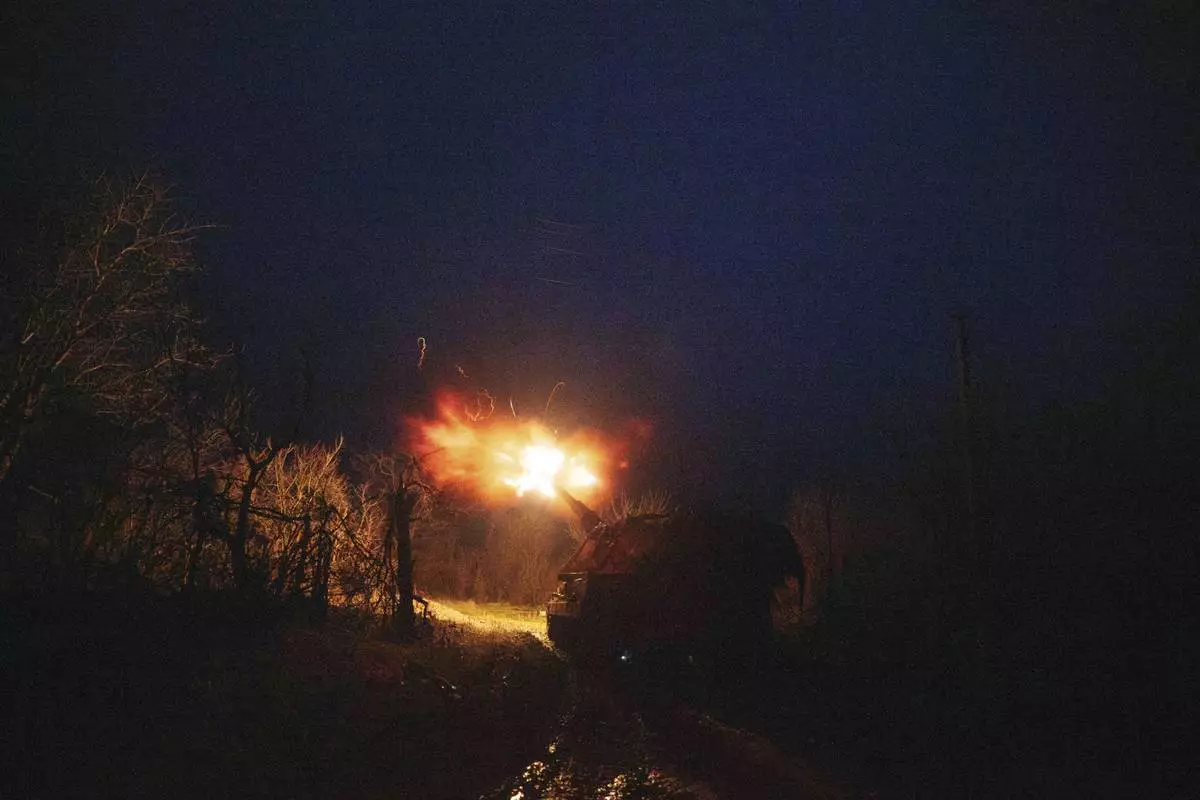
A Ukrainian AS-90 self-propelled artillery vehicle fires towards Russian positions at the frontline on Pokrovsk direction, Donetsk region, Ukraine, Wednesday, Dec. 23, 2024. (AP Photo/Evgeniy Maloletka)
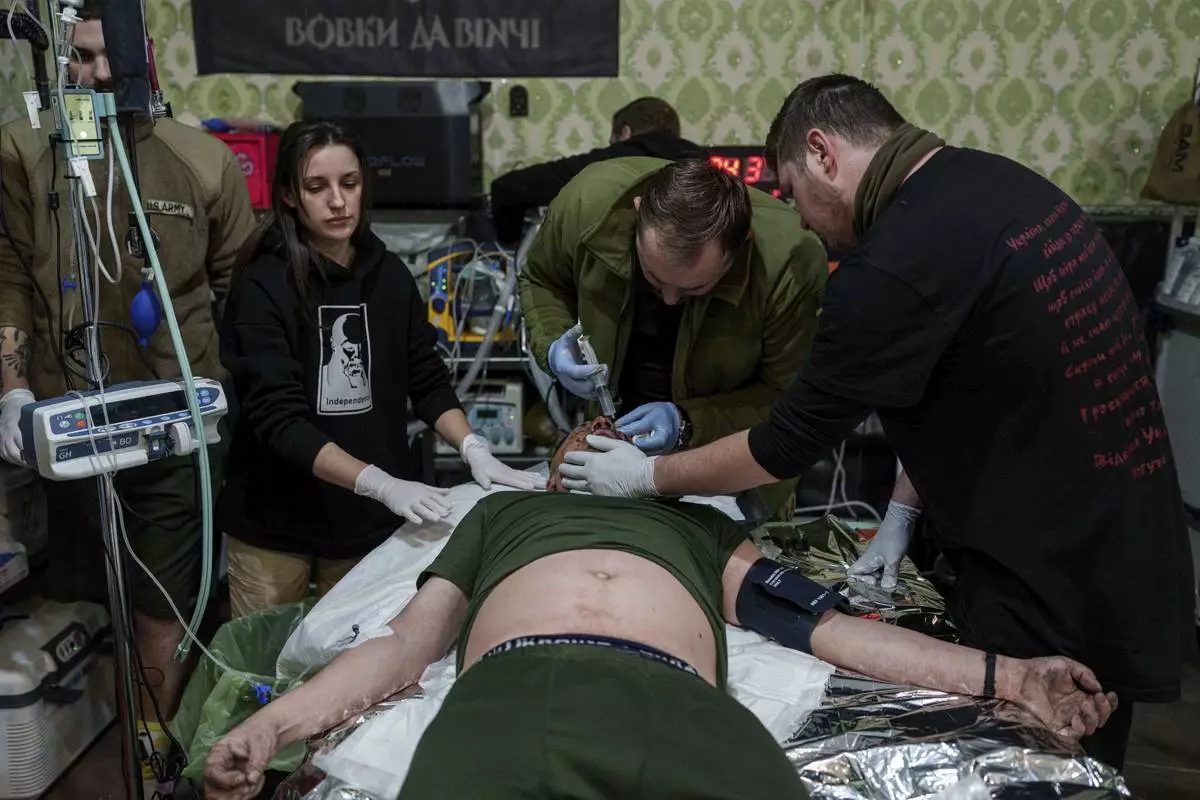
A medic treats an injured Ukrainian serviceman at Medical Service "Ulf" of the 108th Separate Battalion "Da Vinci Wolves" on Pokrovsk direction, Ukraine, Monday, Dec. 23, 2024. (AP Photo/Evgeniy Maloletka)
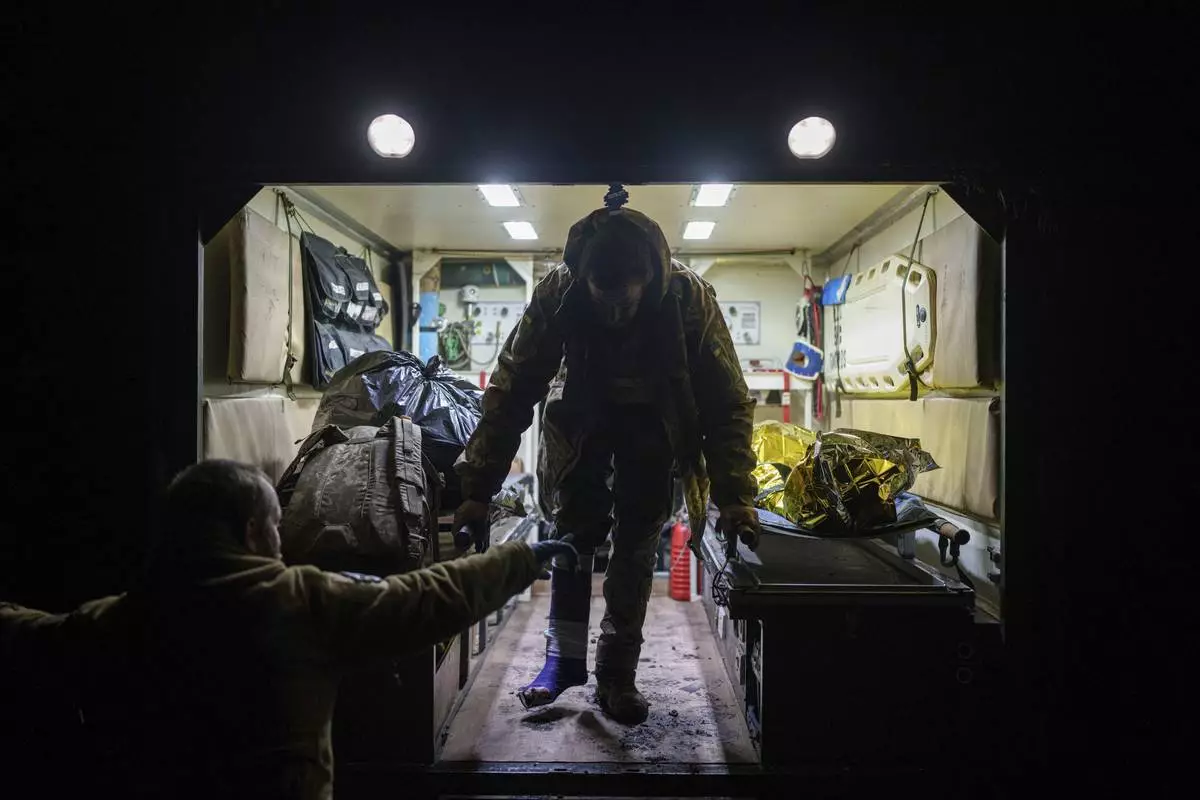
An injured Ukrainian serviceman walks out of an ambulance at Medical Service "Ulf" of the 108th Separate Battalion "Da Vinci Wolves" on Pokrovsk direction, Ukraine, Tuesday, Dec. 24, 2024. (AP Photo/Evgeniy Maloletka)
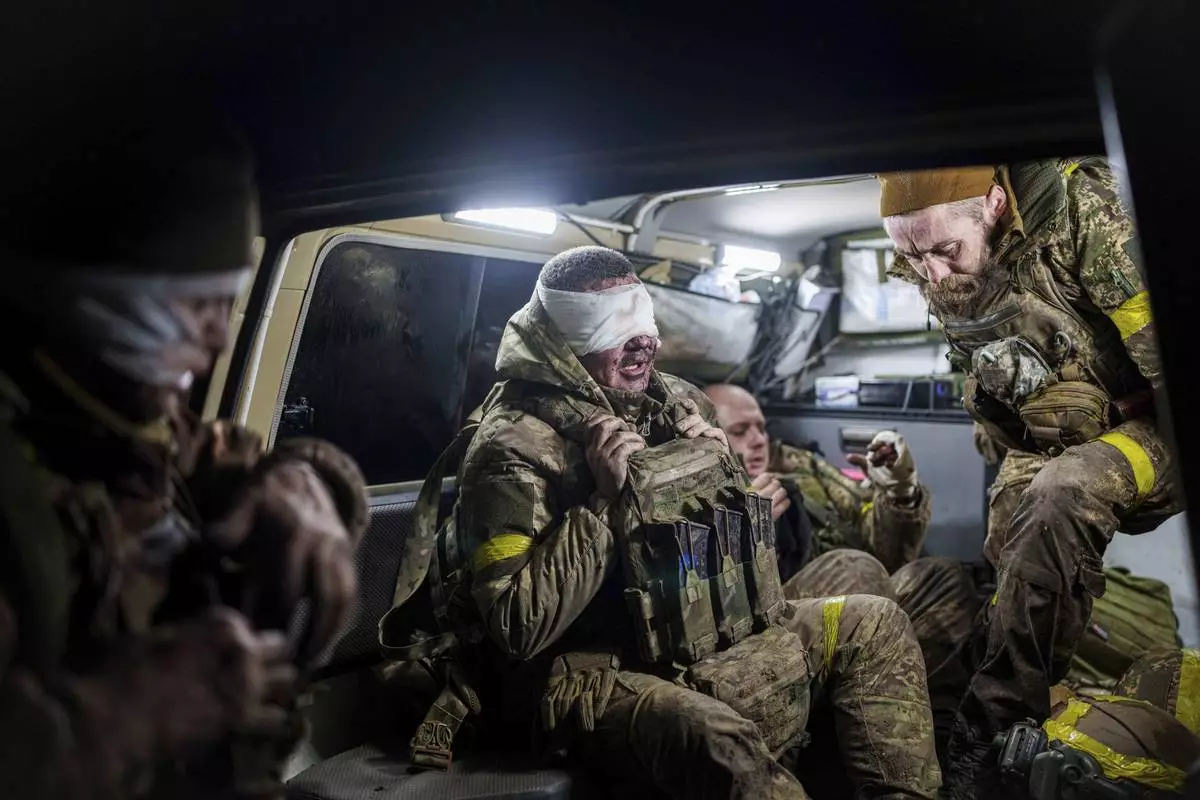
Injured Ukrainian servicemen arrive from the battlefield at Medical Service "Ulf" of the 108th Separate Battalion "Da Vinci Wolves" on Pokrovsk direction, Ukraine, Monday, Dec. 23, 2024. (AP Photo/Evgeniy Maloletka)
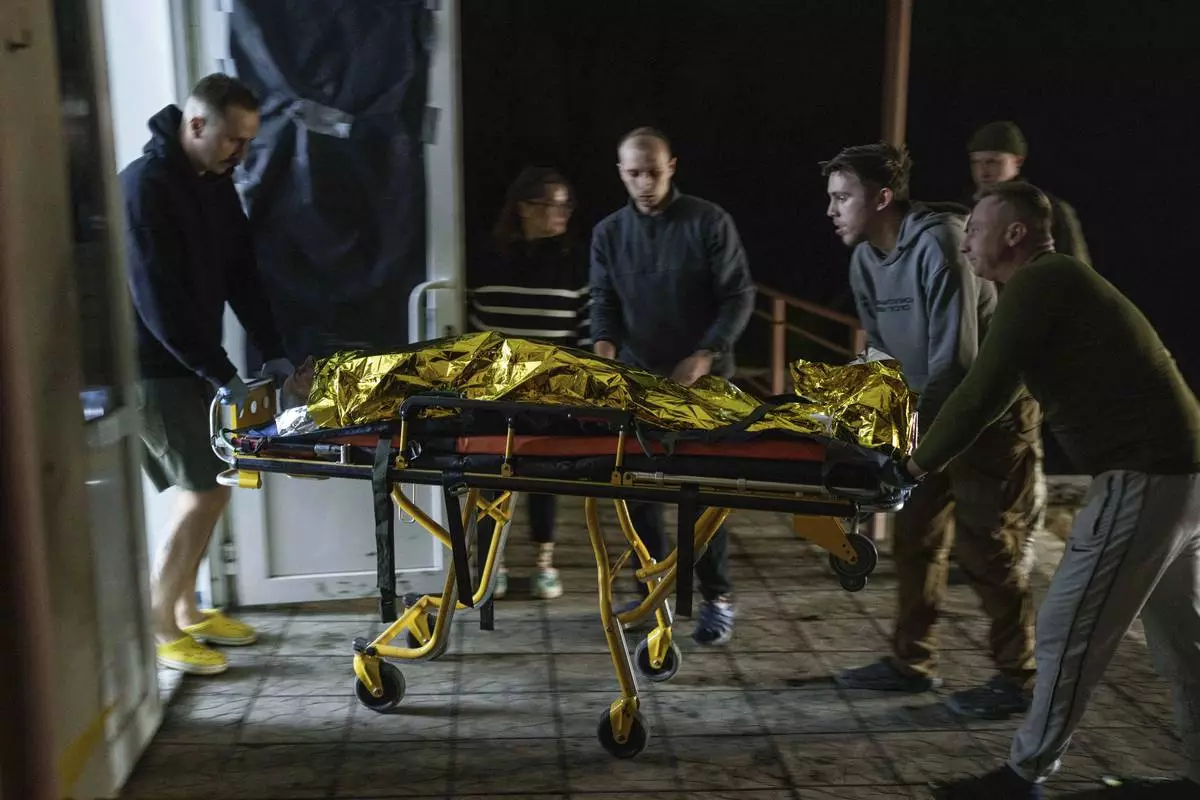
Medics haul an injured Ukrainian serviceman on a stretcher from an ambulance at Medical Service "Ulf" of the 108th Separate Battalion "Da Vinci Wolves" on Pokrovsk direction, Ukraine, Tuesday, Dec. 24, 2024. (AP Photo/Evgeniy Maloletka)

A medic treats an injured Ukrainian serviceman at Medical Service "Ulf" of the 108th Separate Battalion "Da Vinci Wolves" on Pokrovsk direction, Ukraine, Monday, Dec. 23, 2024. (AP Photo/Evgeniy Maloletka)

A medic checks the ear of an injured Ukrainian serviceman at Medical Service "Ulf" of the 108th Separate Battalion "Da Vinci Wolves" on Pokrovsk direction, Ukraine, Tuesday, Dec. 24, 2024. (AP Photo/Evgeniy Maloletka)

A medic helps an injured Ukrainian serviceman walk out of an ambulance at Medical Service "Ulf" of the 108th Separate Battalion "Da Vinci Wolves" on Pokrovsk direction, Ukraine, Tuesday, Dec. 24, 2024. (AP Photo/Evgeniy Maloletka)

An injured Ukrainian serviceman takes off his shirt after arriving from the battlefield at Medical Service "Ulf" of the 108th Separate Battalion "Da Vinci Wolves" on Pokrovsk direction, Ukraine, Monday, Dec. 23, 2024. (AP Photo/Evgeniy Maloletka)
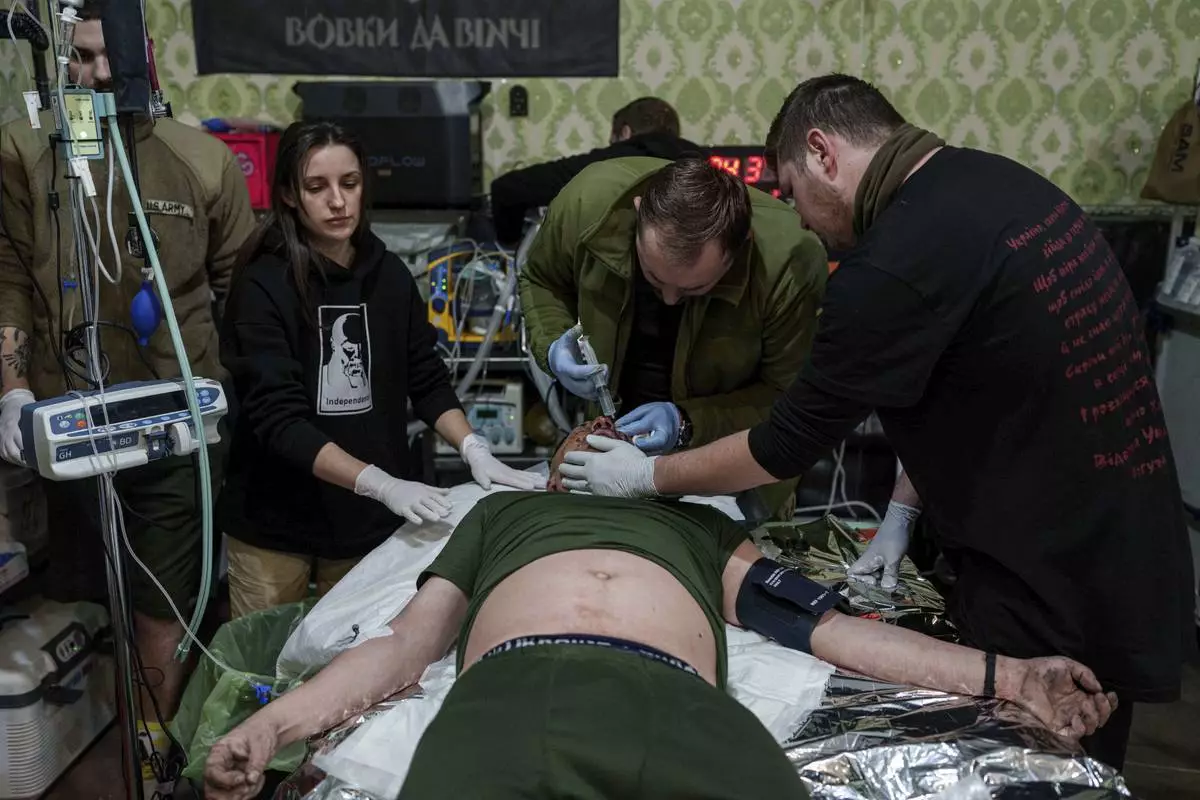
A medic treats an injured Ukrainian serviceman at Medical Service "Ulf" of the 108th Separate Battalion "Da Vinci Wolves" on Pokrovsk direction, Ukraine, Monday, Dec. 23, 2024. (AP Photo/Evgeniy Maloletka)




















